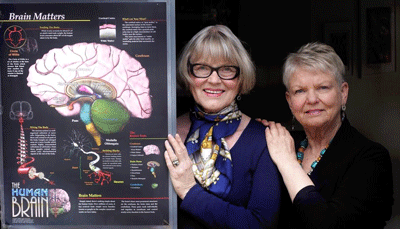How To Recall Names
It was the worst moment of Steve’s life. At least, it felt like it.
He introduced his major new client to the CEO and he couldn’t remember the client’s name!
Has something like this ever happened to you?
It damaged Steve’s credibility.
It made his boss wonder if Steve’s getting too old for his role.
That was a bad moment for Steve. And it can be a worry for you too.
By the time you reach your 50’s and 60’s, you’re in a senior role, just as Steve was.
Here’s how Steve put it,
‘There are certain people I see quite often, but I might be sending them an email or talking to them in person, and I can’t remember their name’.
This is SO frustrating!
And, because it is so public, forgetting names is one of the most embarrassing ways your memory lets you down. It is seen as a sign of age.

Is it normal to forget names?
Memory changes in your 50′s and 60′s are usually quite normal.
And as I say, over and over, normal, but NOT acceptable!
People who forget in public lack confidence.
Forgetting makes them seem older, uncertain and not up with the play.
And you don’t need to accept that image for yourself.
No matter what age you are.
Your memory does change in a few specific areas around the age of 50 but there are ways of making sure that no-one else notices.
So what can you do? Start learning techniques like this one:
Two-Minute solution for Recalling Names:
- When you are being introduced, listen carefully for the name. If you don’t hear it clearly (some people make it really difficult!), ask for the name again. It isn’t impolite because it shows you are really interested.
- Pay attention to the name and face; look the person in the eye and, if possible, include the name in your next sentence “Peter, I have been looking forward to meeting you.”
- In the few seconds or minutes you have, think of the name. If it is unusual, ask a little more: ‘MacDonald – that’s an interesting name. Do you have a Scottish background?” Listen carefully to the answer.
- Associate the name with an image, if one quickly comes to mind. (Someone else with the same name? Maybe the ‘golden arches’!)
- Notice specific features such as highly coloured cheeks (is she ill, has she been rushing to get here?); modern eyeglasses like my son’s; is that the same perfume/cologne I was given at Christmas? hairstyle and so on.
- Take time to associate anything else you hear or notice about the person either in the first conversation or as the event progresses.
- Take a ‘mental snapshot’ of the face and name and try to find a way to use the name again, maybe as you say goodbye.
- In a quiet moment, gaze around the room mentally identifying all of the new people you have met. This recall practice is really important for later remembering.
How does it work?
There are quite a few steps but, in reality, it takes only a minute or two. The SECRET is staying alert though the sequence.
Make sure YOU are in control. It’s a simple strategy. AND. IT. WORKS.
It works because you are listening carefully and giving the face, name and details multiple ways of being encoded into your long-term memory. Then, when you want to recall the name later, you have more than one cue and association to bring the information to mind.
Keep focused.
If your mind wanders or you are thinking of something else at the same time as you are being introduced, your brain will discard the name within a second or so. And you forget!
Step 8 of How to Recall Names is the bonus step for your brain. Recall and repetition are the friends of a good memory. Practice!
Remember: Always be conscious of creating memory traces
You will remember names
You will exercise, rebuild and strengthen an important part of your brain
And your alert and youthful brain will impress your friends!
Congratulations on completing your Memory Check and just two of the 16 strategies you need.
Your free mini-course has given you:
1. Your Memory Check (you can use this over and over)
2. How to remember where you have left your car keys (and other things that ‘vanish’!)
3. How to remember names and create memory traces
Imagine the difference all 16 memory strategies will make to your life.
We have a special offer coming in your next email – don’t miss the chance to master the other 14 memory skills.
Happy remembering!

Gillian Eadie
MEd, BA, Dip.Tchg, LTCL, Churchill Fellow, HFITPNZ (L)
Dr Allison Lamont
PhD, MA (1st Hons), NZAC, NZPsS, APS, ASSBI (R)
